| |
"It wasn't the glamour of filmmaking, it wasn't for money, or certainly not to be famous. It was because the idea of capturing stories on film and entertaining an audience was always something that completely fascinated me." |
| |
Michael J. Murphy |
Michael J. Murphy was, until very recently, a name that I thought I heard fleetingly some time ago but that my untrustworthy memory may well may be mistaking for someone else. Michael Murphy, after all, is also the name of one of Robert Altman's favourite character actors, one who had a prominent supporting role in one of my favourite movies, Oliver Stone's Salvador. But this Michael Murphy, Michael J. Murphy, was not an actor but a writer, a producer, a director, a cameraman and an editor, usually all at once on films where he also built the sets and did the makeup effects. Yet despite a body of work that was large enough to bulge the seams of what is far and away Indicator's most ambitious box set yet, precious few people have heard of him or seen any of his films.
The clue to why lies in the subtitle of this box set, The Microbudget Cinema of Michael J. Murphy. Murphy never made a film that was widely distributed in cinemas or screened on any of the main British TV channels. He never took any of his movies to Cannes, and he was never even in consideration for any category of BAFTA. Yet after watching everything in this mammoth set, I was left with the suspicion that had he followed a different path, he might have done all three.
Impressed by the young Murphy's talent and enthusiasm for filmmaking while he was still at school, his headmaster helped to land him a place as a trainee director at Elstree Studios, at which point Murphy was just 16 years of age. Due to strong union rules of the day, he seems to have spent much of his time there watching established filmmakers work (including a day observing Stanley Kubrick directing 2001: A Space Odyssey) until the studio was taken over by EMI, at which point Murphy elected to leave before he was pushed. Undiscouraged, he returned to making movies as a hobby, funding their miniscule budgets however he could, and writing, directing, photographing and editing them himself, with the characters played by friends and members of amateur dramatic groups. While his earliest works were shot on an 8mm home movie camera, he quickly moved up to 16mm film, and later to mini-DV video and eventually HD. Many of his films were shot in locations that he had free access to or were cheap to rent, and all were filmed in either the UK or in the bright sunshine of small coastal towns in Greece.
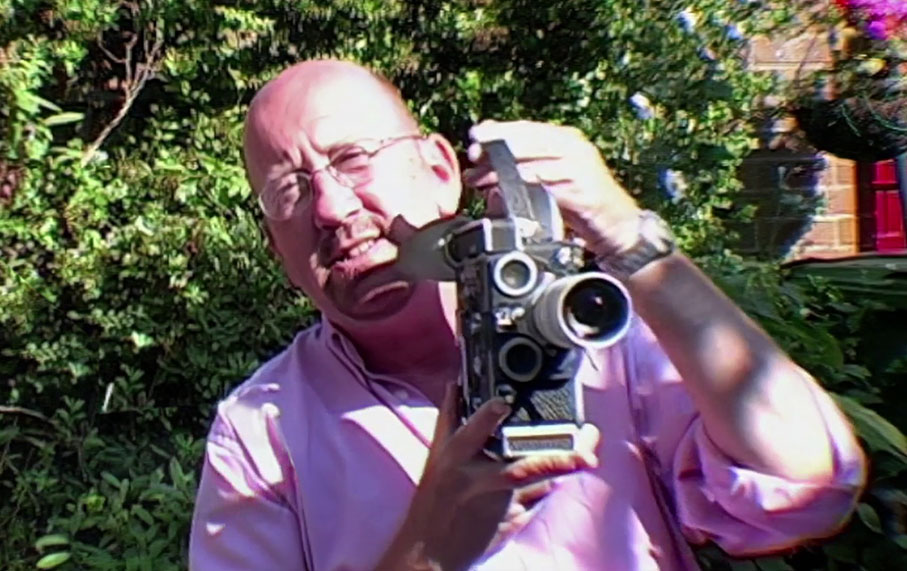
I have little doubt that the do-it-on-the-cheap nature of Murphy's early works will make them easy targets for mockery for some, particularly those who have grown up in the digital age. Nowadays you can genuinely make a movie for next to nothing and be certain that the visuals will be HD sharp, the soundtrack will be clear, and there's a good chance that even the visual effects will look slick, even if you elect to do all of these tasks yourself. Back in the late 1960s and 70s when Murphy started making short films, it was a different story, and I'm speaking from the voice of personal experience here. Today, you can shoot the whole film on the smartphone in your pocket and do a hundred takes of each shot if you so please, and the only thing that this will cost you is time. You can review the footage immediately after it is shot and retake it if you so please, and when complete you can load it onto a laptop and edit it, colour grade it, add multiple soundtracks, effects, and titles and bang out a crisp-looking finished work for uploading to whatever social media platform you favour. Camera sensors now are so sensitive that you can shoot by candlelight and the resulting footage will still look pristine, and if there's anything you don't know how to do, the answer is a mere YouTube click away. Now try to imagine how it was for budding filmmakers like Murphy back when they started making their own movies. He wasn't a rich man, and 16mm film cameras were expensive to hire or to buy. Film stock was also costly, and every take of every shot you filmed thus burned an ever-increasingly large hole in your pocket. And since the film then had to be sent off for processing, you might have to wait up to a month to see if what you had shot was what you wanted or was even any good.* And what if all of your unprocessed film was somehow lost in the post? This happened to Murphy and not only wrecked the film he was making but cost him thousands of pounds that he could ill afford and was unable to retrieve. Film stock was nowhere near as sensitive as today's digital camera sensors, and thus required a ton of light to expose correctly. There were no lightweight LED lights back in the 1970s, and the ones we did have ate electricity and generated insane amounts of heat. Shall I go on? On this score, I found myself really empathising with Murphy. Having also started out on standard 8 film, moved on to 16mm, then VHS, SHVS, mini-DV and eventually HD, I recognised all of the technical touchstones here. The difference is that I never wanted to be a director, just be involved in the making of films. Why that ambition ultimately stumbled and fell is a story for another time. Maybe.
With all this in mind, I have little doubt that some will watch Murphy's early work and scoff at what they see as its amateurish nature. And given that he was an amateur who was learning on the job by experimenting with ideas and equipment and calling on the help of other non-professionals, there is a degree of inevitability to this. As someone who made his own 8mm movies and spent years viewing and grading media student videos, I recognised many of the giveaway traits with a fond smile: the amateur actors who struggle to emote and pronounce every word as if attending an elocution class instead of speaking the way they would in real life; the pauses that bookend every line of dialogue and make scenes feel like assembly edits; sharp weapons like swords or knives that are slowly inserted rather than thrust into victims; unchoreographed fights whose participants go out of their way to avoid hurting themselves or each other. The fact that Murphy shot many of his 16mm films on a clockwork Bolex only adds to the sometimes inescapable air of artificiality. Precise framing with this camera was nigh-on impossible because the viewfinder was slightly out of line with the lens, and the camera was so noisy in use that he would often shoot silent and have the performers dub their lines in post-production. This a skill that even trained actors have to work at to master, and expecting non-professionals to emote whilst watching the film and trying to match the timing of your words to the mouth movements of your character is a big bloody ask. I know because I've had to do it myself, and despite my best efforts, I was crap. Some oft-repeated elements are revealed in the special features to be signature traits that Murphy was fully aware of, and include a fondness for shots filmed through the flames of firelight and the use of Gaelic fonts for titles and credits, and a complete disregard for the 180 degree rule.
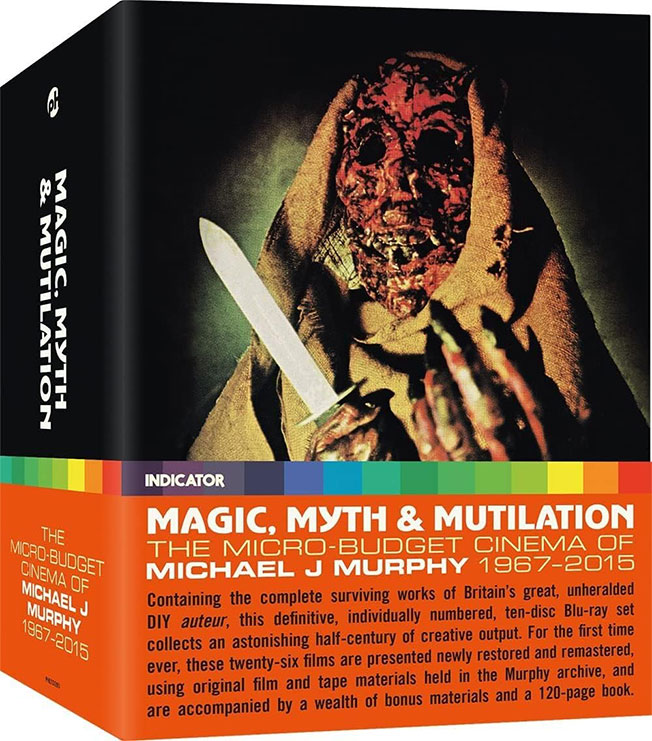
What we have in this huge 10-disc Blu-ray collection is every surviving piece of every movie that Murphy ever made, a truly mammoth job on the part of the team responsible for this release. The surviving fragments of the films that could not be fully restored are presented as special features on the first disc, but as one of the real pleasures of this set is to be able to chart Murphy's development as a filmmaker from enthusiastic schoolboy right up to his untimely death, I decided that it would make sense to watch all of his films – including the incomplete ones – for the first time in the order in which they were made (with one notable exception that is explained below). I have thus wandered a little from our usual format and written about each of the films and the fragments in the order that I watched them, immediately after I watched them. As a result, some of the special features from disc 1 are reviewed before I actually get to the Special Feature section. It'll all make sense when you get to it.
For me, this proved a fascinating and often surprising journey, with the films I expected to like the most overshadowed at seemingly every turn by ones I would not have expected to have warmed to so readily. I elected to write a little about each film immediately after I watched it for the first time, and only made alterations later if the special features revealed I'd made a factual error or they prompted me to give the film in question a second look, which I often did anyway. I should note, as ever, that all comments are purely personal ones shaped by my own taste in films and my viewing experience, and in this case my years working on amateur productions and with student filmmakers. This will see me swim against the prevailing tide a little, as while Murphy's minor cult status is built around his horror works, for me, there are far more interesting films in his oeuvre. Make no mistake, I'm a horror fan, and being old enough to remember when admitting a fondness for low to medium budget horror would invite the scorn of serious cineastes, it's great to see the critical turnaround that sees the genre treated as seriously as any other. But it's got to the point where horror is sometimes so over-analysed now that it's given a free pass in areas where films of similar quality from other genres would be roundly slammed, and has as result has become a literal definition of cult cinema. Again, this is probably a discussion for another day.
Anyhow, this review is long overdue and my proof reader is waiting for me to stop babbling and send him this overlong dive into the world of Michael J Murphy, so let's get going with…
| THE FILMS [Part 1: 1967-1986] |
|
As noted above, I've watched and commented on all of the film in this set – including the fragments of incomplete works – in the order in which they were made.
(1967)
Torture, rape, murder, graphic heart removal, and suicide by beheading are all thrown into the mix of what plays like a Kenneth Anger inspired early silent (but musically scored) short film from the then 15-year-old Murphy. Fireworks stand in for volcanos, and the sword used for the beheading was clearly constructed by covering the blade of a plastic weapon with tinfoil. And it doesn't matter a damn. A violent and invigorating assault on the senses with energised camerawork and editing that confirms from the off that this boy had talent and vision. I really liked this.
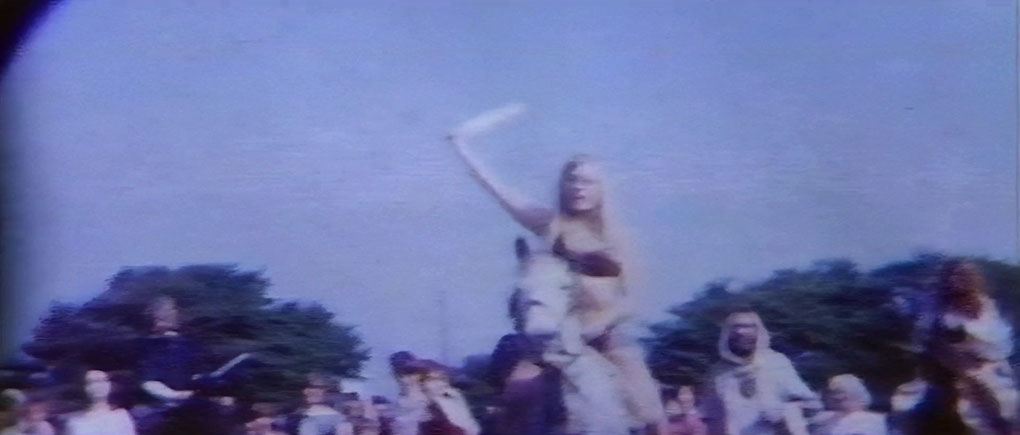
(1968)
You can't fault the then 16-year-old filmmaker Murphy for his ambition. This silent 8mm short opens with a low rent but surprisingly large scale and briskly edited recreation assault on the Roman held town of Camulodunum (now Colchester) led by Boadicea, then skips back in time (at least I think it does) to show her being romanced by Prasutagus, king of the Iceni tribe, before bearing the first of her two daughters and (maybe) taking her own life by swimming out to sea (as far as I'm aware, whether she died from illness or poisoning is still a matter of conjecture). Some shots linger on for longer than is needed, but the cut from Boadicea and Prasutagus kissing on the shore to Boadicea cradling her first child is a genuinely inspired time-jump edit.
(1970)
This is discussed later in this list on page 2.
(1971)
The only surviving film elements from Murphy's take on the Greek myth at the core of the 1981 Clash of the Titans, complete with a carboard Kraken that Perseus confronts with the head of Medusa. Was apparently intended as a pilot for a series and submitted to the BBC, who never returned it.
(1974)
Low-budget independent filmmaker Chris (Jonathan Whalley), leading man Mark (John Wright) and his older co-star Helen (Helena Zeffert) arrive in Greece to shoot scenes for their latest production. Helen is wrestling with some past demons, and politely rebuffs the younger Mark's amorous advances, claiming that she wants to avoid a repeat of the emotional hurt she suffered after a recent breakup, but this doesn't stop her from seducing good-looking Greek actor Andreas (Paulos Charalambidis). When out walking one day, however, she finds herself in the woodland lair of Alexandro Constantino, a masked local legend who requests that she remain with him to help break the curse under which he has been placed.
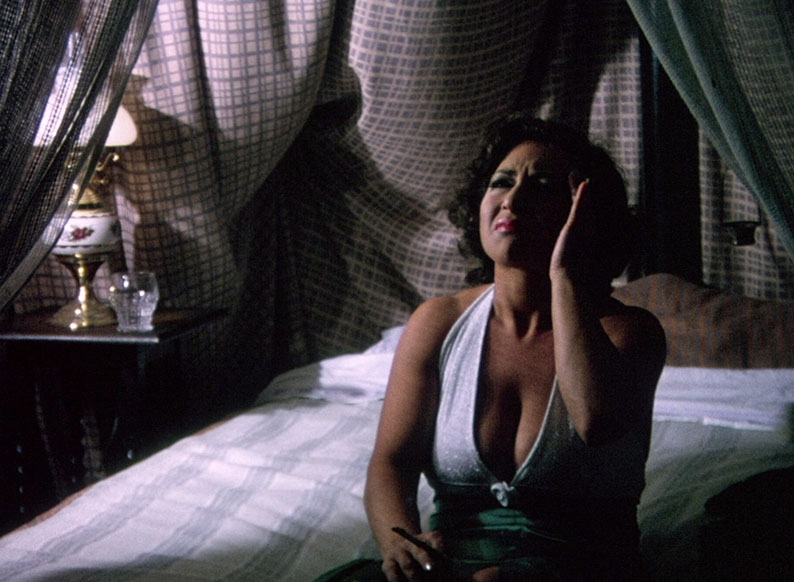
There's more than a whiff of Beauty and the Beast to the fantasy folklore element that edges its way into the film and that may be real or the product of the troubled Helen's imagination, and it's she that provides the film with its emotional core. Acting matters here, and while the men are as wooden as laminated planks, Helena Zeffert really throws herself into the role of the unhappy Helen, convinced that her best years are behind her and using alcohol and gregarious flirting to mask an inner sadness that borders on desperation. An interesting pointer to the more complex and layered stories that Murphy was to later tell.
(1976 first version)
The only surviving seven minutes of an ambitious-looking apocalyptic drama, in which a couple whose friend dies of a mysterious disease (at least that's what I'm guessing from what remains), so they bury the body and flee into town, where they discover that he was not the only one affected. Murphy's developing skills as cinematographer deliver a couple of neat and expressive shots here, my favourite being the wide pan of the couple running down the quay that ends on a closeup of a dead girl slumped over a table. This has been sourced from Murphy's own tape copy and has no sync sound, and instead has an unsettling violin score.
(1977)
Murphy's first (surviving) feature-length movie still has some of the learning-on-the-job aspects of his previous shorts, and there are a couple of technical elements that don't quite click, but this is still an often impressively confident step up that provides solid evidence of his continuing development as a filmmaker. It certainly gets off to an impressively economic start, setting up the situation that will kickstart the plot in a tight couple of minutes. On a sleepy Greek island, Vicky (Caroline Aylward) is fed up with looking after her abusive and handicapped grandmother, and uses every opportunity to sneak off and spend time with her lover, Steve (Michael Cattle). When she takes her grandmother out for some air one day and stops to smell some flowers, granny lashes out at her with her cane, in the process overbalancing her wheelchair and tumbling down a steep hill to her death. Far from being shocked, Vicky is relieved to now be free to marry Steve, sell the house, and leave an island she has clearly dreamt of escaping from for years. There's just one problem. The will states that Vicky will only inherit her grandmother's money if she keeps the house and lives in it for 11 months of each year. She thus reluctantly stays put, and when Steve lands a job managing a local restaurant, he suggests that they hire someone to help around the house and keep Vicky company while he's at work. With no-one on the island willing to come near a house that they believe is haunted, the couple advertise in England and secure the services of young Liz (Carol Aston).
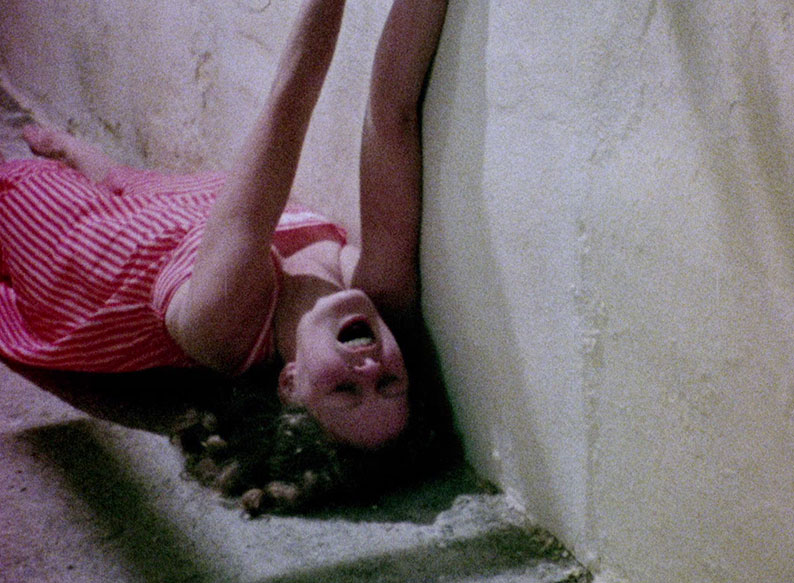
This is really just the setup for a plot that has more twists than I was expecting, and it's this and the oddly ominous atmosphere that hangs over many scenes that held my interest throughout. The performances are functional but for the most part little more than that, with a flat lack of emotion and even inflection to much of the line delivery (the post-dubbed dialogue is partly to blame here), but there are scenes later in the story – whose content I'm not about to reveal – that require more physically expressive work from one of the actors, and here they really deliver the goods. There's a lack of musical consistency to a score sometimes feels like a mixtape of tunes, but the repeated use of one piece built around a pulsing bass synthesiser note is rather effective. The influence of Henri-Georges Clouzot's Les diaboliques is evident, and there's a neat whiff of the later Misery to a couple of scenes, and the result is an interesting and intermittently surprising work, handsomely shot by Murphy himself and making evocative use of the sun-drenched Greek locations. With more experienced and expressive actors, I have a feeling this could have made a greater impact than it presumably did.
(1978)
The only surviving silent footage of what looks like a relationship drama revolving around a group of young filmmakers shooting on location in Greece. This appears to have been sourced from a tape copy and has been given a bouncy piano score.
(1979)
Aspiring writer Terry (Tim Morris) travels to Greece to spend a holiday with his celebrated movie director father and the younger actress Alex (Carol Aston) that his father has recently married. When work delays his father's arrival, Terry is able to spend some time alone with Alex and work on his latest story, but he seems to be planning something sinister.
A psychodrama that oddly feels simultaneously plausible and a bit of a stretch, one whose situation I became more invested in than the characters, particularly the ominous clues that are dropped in the early scenes. The photography lacks the sparkle of Secrets, but there's a great, De Palma-esque shot that frames the eye of one character against the background actions of another. The soundtrack clarity has seen better days, and here the optional subtitles really came to the rescue for this tinnitus-afflicted viewer. The ending left me with a slew of questions about the scenes that precede it, and my familiarity with one particular prop did foreshadow a later reveal.
(1979 second version)
Murphy's second stab at The Seventh Day has ironically suffered the same fate as the first, being now lost save for five surviving minutes, which doesn't prove enough for me to state with any authority what is actually taking place.
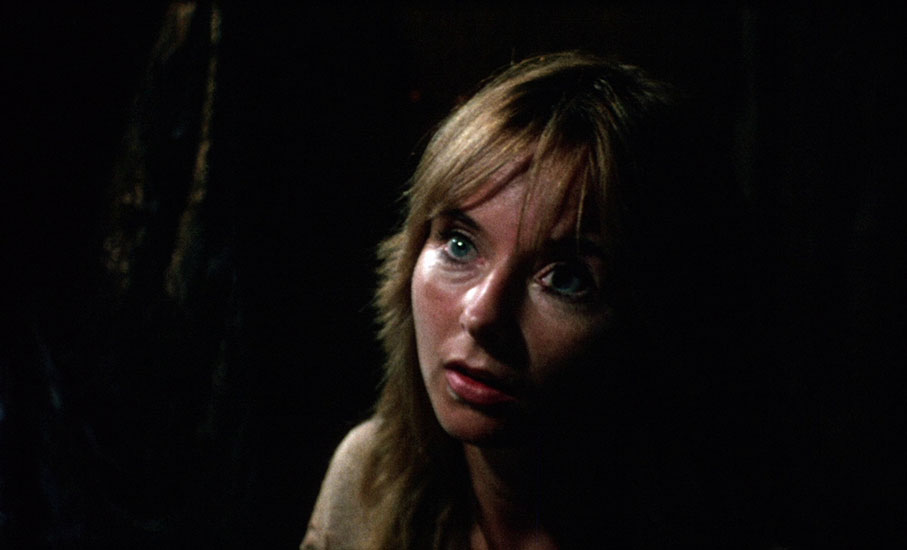
(1980)
Winner of a Movie Maker Ten Best Competition Four Star Award, this short film takes place primarily in the cell of a condemned prisoner (Russell Hall) in medieval Russia on the eve of his execution, as he converses with the prostitute (Carol Aston) who has been paid to spend his final night with him. It's a solid foundation for a short film and is decently scripted and atmospherically shot, and while Hall's precisely spoken delivery lacks emotion, Aston is not at all bad as a woman who is revealed to be nursing her own tortured memories. Murphy actually appears in this one as a jailer.
(1980)
Winner of a Movie Maker Ten Best Competition Gold Star Award, this is probably Murphy's most narratively straightforward film yet. Good-looking 21-year-old Paul (Russell Hall) hires a holiday apartment in Greece and starts a friendship with his older married landlady Gill (Carol Aston), one that quickly develops into something more. It turns out, however, that Paul is hiding a terrible secret.
I admire Murphy's ambition here, but a story such as this to really work it needs to have a sharp script, convincing and ideally naturalistic performances, and characters that you really bond with, and (slowly and nervously sucks air through his teeth) for me Stay had none of those things. Initially clunky dialogue becomes functional at best, and by the halfway mark I had all the information I needed and from then on felt like I was marking time. Now I should point out that this is just me and that others will likely have a different reaction and good luck to them. And it's not that I'm adverse to such stories, having wiped away tears during the final scene of François Ozon's thoughtful, sensitive and deeply moving 2005 Time to Leave. Hopefully, others will get more out of this one than I did, but with so many other films of greater interest in this set, not responding to this one didn't exactly leave me feeling hard done by.
(1981)
Murphy is back on safer ground with this niftily handled and twisty little thriller. Oliver (Russell Hall) and his sister Debbie (Caroline Aylward) arrive at their father's Max's Greek island home for a holiday, where they are greeted by his new young wife Shirley (Carol Aston) and her maid Mary (Jeanne Griffin) in Max's apparently temporary absence. Whilst swimming one day, they make the horrifying discovery of a badly burnt human arm, which is instantly identified as belonging to Max by a distinctive ring on one of the fingers. Although his death is thought initially to be the result of an explosion on his yacht, the police suspect foul play, and Oliver and Debbie start theorising that Shirley killed Max to gain control of his quayside business. Shirley, meanwhile, has similar doubts about Oliver and Debbie, whom she learns are involved in an incestuous relationship.
What subsequently unfolds is driven by mounting suspicion and paranoia on the part of all three family members, as one seemingly bad decision fuels another, delivering a handful of genuine plot surprises on the way. The performances here are a little stronger than those in the preceding films, with three of Murphy's regular actors starting to polish their skills, and while I may have winced every time Hall says the word "Yes" (the one word that feels like it's being read off a cue card every time), when he silently stares at Shirley, he exudes an air of brooding menace that really works for his character. I'm happy to say that I rather enjoyed this one.
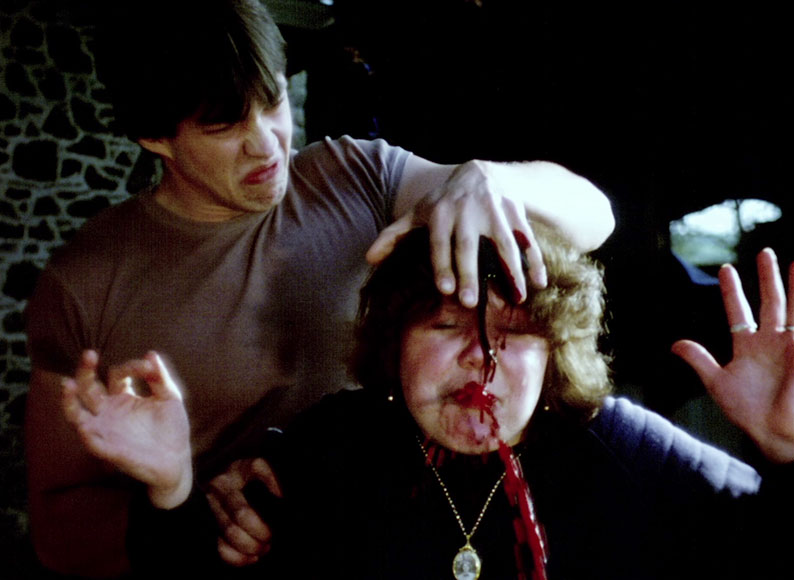
(1982)
When Jacky arrives at her friend Laura's farmhouse for a visit, she's immediately dressed up and involved in a horror-themed fancy dress party that is already under way. At one point, the guests all file outside, where they are handed lighted torches and make their way to a strange place in the woods, where a frightened Jacky is forcefully sedated. The next morning she wakes to find deep scratches on her thigh, and when she challenges Laura about what happened, her host is apologetically evasive. When Jacky threatens to leave and go straight to the police, Laura's husband Alan (Stephen Longhurst) warns her that "he" will stop her if she tries. Jacky jumps in her car anyway but gets only a few metres before the car conks out, and she is stopped from going further by the unexpected arrival of her boyfriend Rick (Russell Hall).
A microbudget trip through a number of familiar folk-horror tropes that benefits from an eerie atmosphere and a decent lead performance from Becky Simpson, but more than any of the preceding films has a (rather charming) "my mates and I decided to make a horror film" feel. For me, the result feels more like a sketchbook of interesting ideas for a more fully realised movie that was never later made than a completed work. That said, it does have its pleasures, and in a supporting cast whose acting skills are variable at best, I rather liked the silent and muscular farmhand Maurice (Colin Efford), who unwillingly does the bidding of whatever it is that has a hold on the house. I know I'm kicking against a sizeable portion of the Murphy fandom with my opinion on this one, but having written the above, then watched all of the special features and returned to it a second time, I've not substantially altered my view. I should note that it's one that the interview material in this set tends to suggest that Murphy shared.
When selecting the Play option here, you are offered the chance to watch either the original version, or the revised version prepared to Murphy's instructions for the film's 2008 Sarcophilus Films DVD release, completing some previously unfinished 'red eye' visual effects.
(1982)
The Last Night gets off to an old trope of a start when the manager of a small provincial theatre arrives upstairs just too late to hear a radio announcement that two armed and dangerous criminals have escaped from Broadmoor prison top security wing and are on the loose. Ooo, where do you think they'll end up hiding out? Tonight is the final night of a run of a play with the ominous title Murder in the Dark, and as the members of an amateur theatre group prepare to go on stage, a birthday surprise is being planned for one of their number, Helen (Catherine Rowlands, formerly credited in Murphy's films as Catherine Aylward and now as Caroline MacDowell). While all this is going on, the two escaped criminals, Mike (Steven Longhurst) Gary (Colin Efford), sneak in and make their way up to the loft with the aim of hiding out there for a few weeks after the performance ends and the theatre closes. But when two of the actors, Dave (Clifford Gardiner) and Rita (Nanda Adkin), nip upstairs for a quick one while their characters are off-stage, events take a particularly nasty turn.
The influence of home invasion thrillers of the 1970s like Death Weekend and The Last House on the Left is evident here, but by shifting the location to a creaky provincial theatre, Murphy gives familiar tropes an interesting edge. I'm not sure if the actors here were all part of the same repertory company, but their chemistry with each other and their comfort in their surroundings and the workings of the venue are a major plus, and while there are no star-making performances here, most acquit themselves rather well. Longhurst and Efford, who played the farm handymen in Invitation to Hell, are again teamed here and rather good as ruthless criminals Mike and the slower Gary. Alyward seems more at ease in the theatre setting than in her previous films for Murphy, and I quickly developed a soft spot for Lindsey Greer as cheery stagehand Sue. It's solidly directed, the violence is gory and sometimes inescapably Freudian, and there's even a nasty bit of implied necrophilia. A well-executed (no pun intended) little thriller.
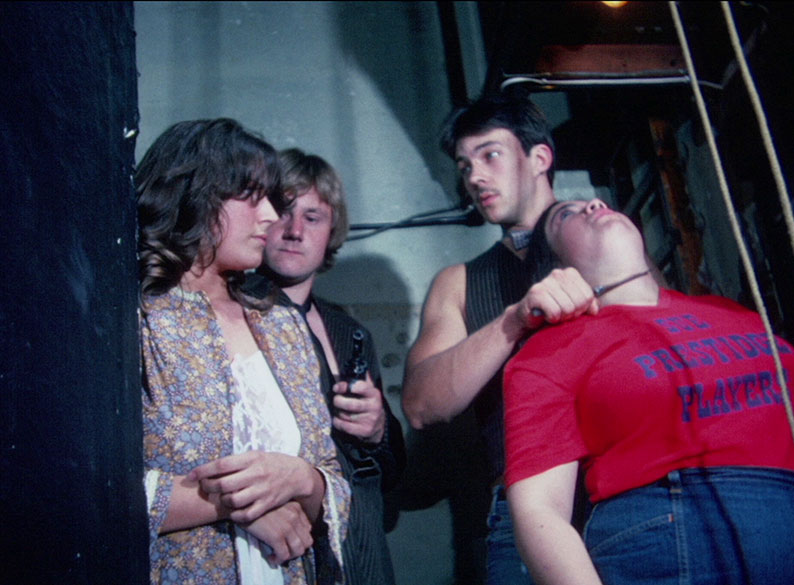
It should be noted Murphy originally planned for The Last Night to be followed by Invitation to Hell as part of a double-bill, but when the films were released by Scorpio Video, Murphy decided that the technical shortcomings of The Last Night should see it relegated to second place, and the order was reversed. Here you are given the opportunity to watch both films individually or as a double-bill in both Murphy's original order and the order in which they appeared on the Scorpio Video release.
(1983)
Neville Harmer (Stephen Longhurst) lives with and takes care of his wealthy and infirm father, who makes his life a misery and mocks his relationship with attractive local girl Vicky Harmer (Catherine Rowlands). When he takes the old man out for a rare walk, the two get into a furious argument, and as Neville walks away in fury, the brakes on his father's wheelchair fail and he rolls to his death. Finally free of his grasp, he and Vicky make plans to sell the house and…
If all this sounds familiar it's hardly surprising, as this is essentially a feature-length remake of Murphy's own 1977 Secrets, with a gender swap that casts Neville as the one haunted by the ghost of his elder relative's death. In other respects, it hits many of the same story beats as the previous film (which I'm not about to reveal here in the likelihood that you've seen neither), one difference being that the home help hired in the first film is already on site at the start of this one in the shape of strapping gardener Patrick (Colin Efford, here credited as David Slater). The performances are more assured than in the earlier film, and Murphy's direction is once again sound, though this does confirm that staging fight scenes for the camera was not yet his forte. The location switch from sunny Greece to gloomy England has certainly impacted the visuals, which are gloomier and less colourful than those of the earlier film, and for those familiar with that first take on the story, Murphy the screenwriter (here credited as Michael Melsack) has mixed things up just a little in the final third. It feels like something is missing from the finale (one character undergoes a huge attitude switch in the course of a single edit), and the final reveal seems just a tad rushed, but on the whole this is a decent remake and expansion of the earlier film.
When you play this film, you can elect to watch it either with its original title, Quälen, or with the alternative The Hereafter title sequence, which appeared on the American VHS edition published by Mogel Video.
(1985)
Budding horror filmmaker Alistair Bailey (Patrick Oliver) presents his low budget magnum opus Bloodstream to his boss, exploitation movie distributor William King (Mark Wells). King tells him it's bollocks and fires him on the spot, but as soon as Alistair has angrily left the building, King admits to the film's lead actress Judy Brooks (Catherine Rowlands), with whom he is having an affair, that the film is really good and will likely make him a fortune. This is overhead by King's personal assistant Nikki (Jacqueline Logan), who secretly arranges a meeting with Alistair to reveal what she knows and help him plan an aptly grisly revenge.
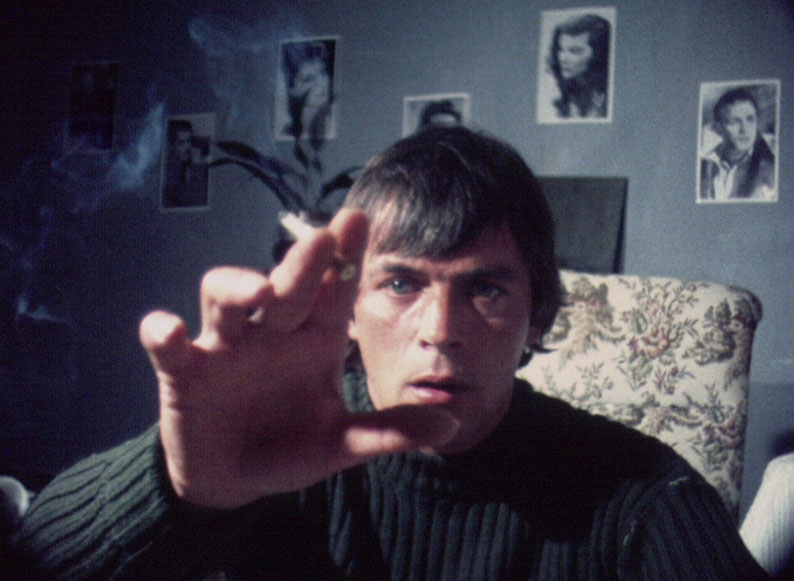
Credibility is stretched like loose elastic here, but Murphy is clearly having a ball staging cheapjack takes on a range of horror works, as the drama is repeatedly put on hold so that Alistair can watch tapes of movies featuring those on whom he intends to wreak his wrath. Bloodstream itself plays like aversion of Night of the Living Dead directed by Herschell Gordon Lewis with a costume borrowed from The Town That Dreaded Sundown, and the tapes Alistair watches cover a wide variety of exploitation subgenres. There's a cheesy vampire flick with pantomime fangs, a biker movie whose brawling protagonists dress like gladiators, a werewolf tale in which the victim is imprisoned in a neatly designed but ultimately ineffective hand-built wooden cage, and a microbudget take on The Exorcist that fakes vomiting in the face of the priest by turning the actors and camera on their side. The one I liked the most has a woman being served one of her husband's buttocks for dinner by an upper-crust cannibal in a dinner suit. Make that movie! The revenge itself has a structure borrowed in part from Theatre of Blood with a dash of Peeping Tom thrown in for good measure, and the film's final message seems to be that exposure to extreme real-life violence leads to violent behaviour, not violent movies. Not great, but rather fun, and as the special features reveal, Murphy was really getting something off his chest here.
Here you are offered the option to play Murphy's director's cut or an early pirated 'bootleg' version that runs for a minute longer – presented here from a VHS source – which features the voices of the original actors who play William King and his secretary, Nikki. In the director's cut, both actors have been redubbed and Murphy provides the voice of King.
(1986)
In long ago Ireland, a warrior knight of King Marc of Cornwall (John Swadling) named Tristan (Stephen Harris) does battle with the King of Ireland's champion. If he wins, the King has pledged the hand of his beautiful daughter Iseult (Catherine Rowlands) in marriage to the ageing King Marc in a move that would will cement an alliance between the two lands. When Tristan triumphs, Iseult initially refuses to accept her fate, but is ultimately persuaded by her father to put the future of the kingdom above her own desires, and given a potion to take that will cause her to fall in love with a man that she might otherwise be repelled by. During a storm on the sea journey to Cornwall, a despairing Iseult throws herself into the sea, and having been charged with delivering her safely to his king, Tristan dives in the water to save her. The two eventually wash up on the shores of Cornwall, and to help revive the dazed princess, Tristan takes the bottle she wears around her neck – one he is under the impression is a reviving spiced wine – and pours some of the contents into her mouth, also taking a swig himself. By the time they reach the court of King Marc, the potion has done its work and the two are hopelessly in love with each other.
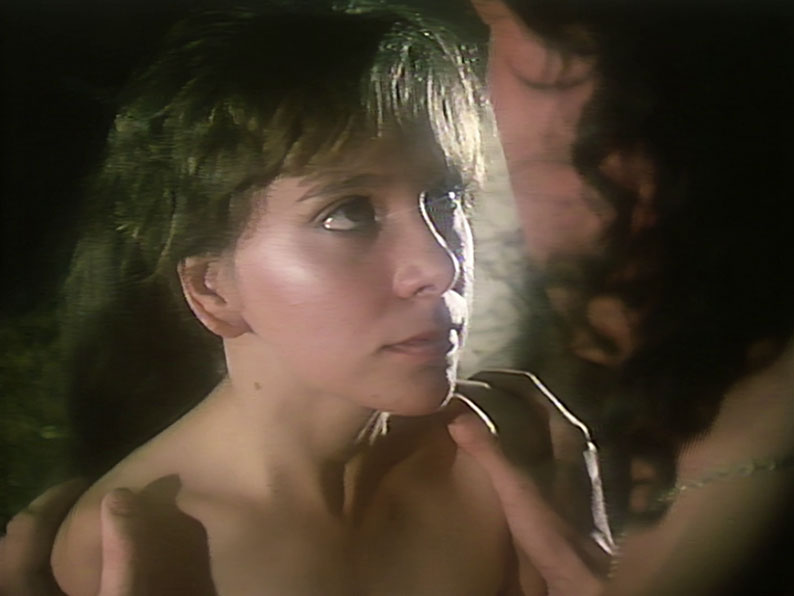
I would think there's an unwritten rule somewhere that if you're making films on microscopic budgets, then you don't even attempt a feature-length drama based on an ancient legend, but either no-one told this to Murphy or he just didn't give a hoot – this was the movie he wanted to make, so he went and did it anyway. On the basis of the premise and some of the dodgier acting and production values in his previous films, I have to admit to having low expectations for what is his longest film yet, but have rarely been so happy to eat my words. Yes, the production must have cost about as much as you'd pay for a rusty car with no engine (sea journeys are done on a papier mâché boat with a sheet for a sail in the darkness of night to avoid having to show the surrounding water), but once you make appropriate allowances for this, Tristan (or if you prefer Legend of a Hero) is really something. It's impressively scripted (by Murphy masquerading here as Carl Humphries) in that poetic olde English that probably has more to do with literary tales of ancient times than how people actually spoke, and while the dialogue is always delivered in a precise theatrical manner, this is one genre in which that doesn't feel remotely out of place. It's smartly plotted, with all of the deception, skulduggery and plot twists of a microbudget Game of Thrones episode, and to my very real surprise the performances here are generally solid and occasionally even better than that. Stephen Harris makes for a handsome and muscular hero, John Swadling makes King Marc feel human and approachable, Patrick Olliver is a splendidly villainous Lord Melot, and I really liked Wendy Parsons as the teenage Iseult of Brittany, who shares a name with the love of Tristan's life and comes to his rescue when he is forced to flee. It's well paced and directed, and the fight scenes are far more convincingly staged than the ones in Murphy's previous films. Even the music score is put to effective use. I enjoyed this so much more than I was expecting, and given the budget that Murphy must have been working with, he worked a whole series of small miracles here. Bravo!
Two versions of the film have been supplied for your edification here, the original 109 minute version and an 88 minute recut by Murphy himself that removes twenty minutes of footage to create a tighter version. Which you prefer will be a matter of personal taste – frankly I was fine with the original edit.
NEXT >>
PAGE 2: THE FILMS [1987-2015]
PAGE 3: TECHNICAL SPECS AND SPECIAL FEATURES
|